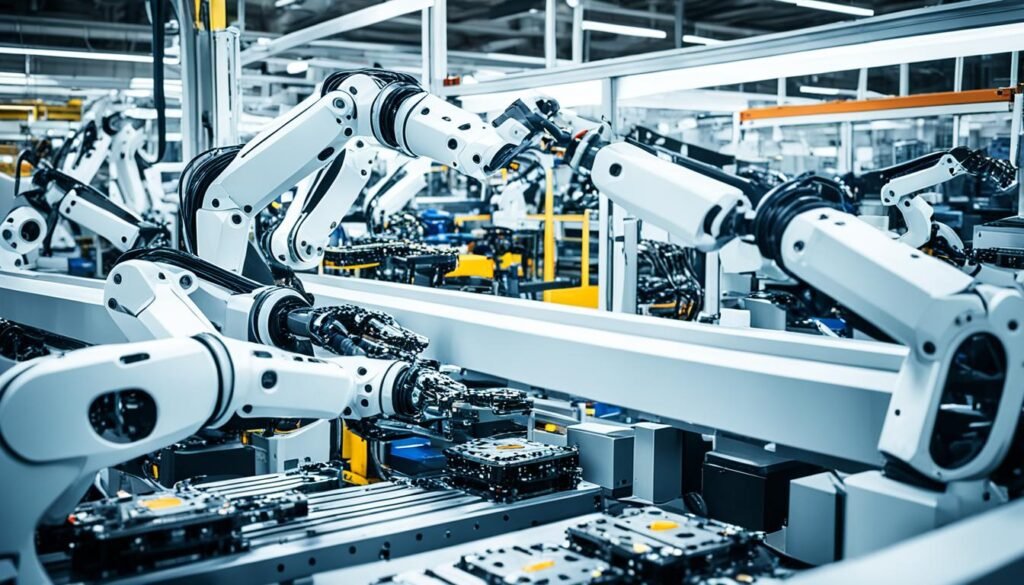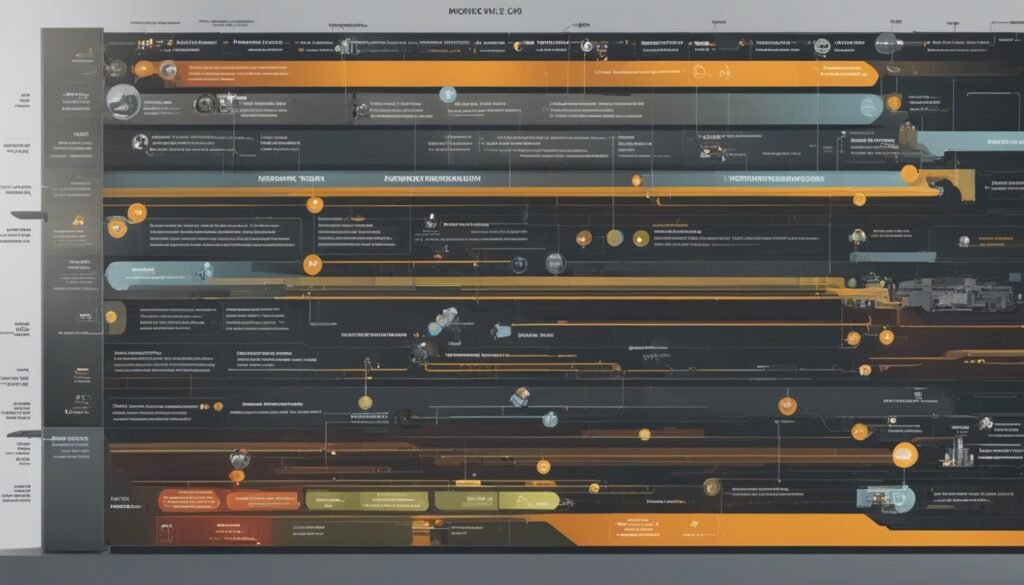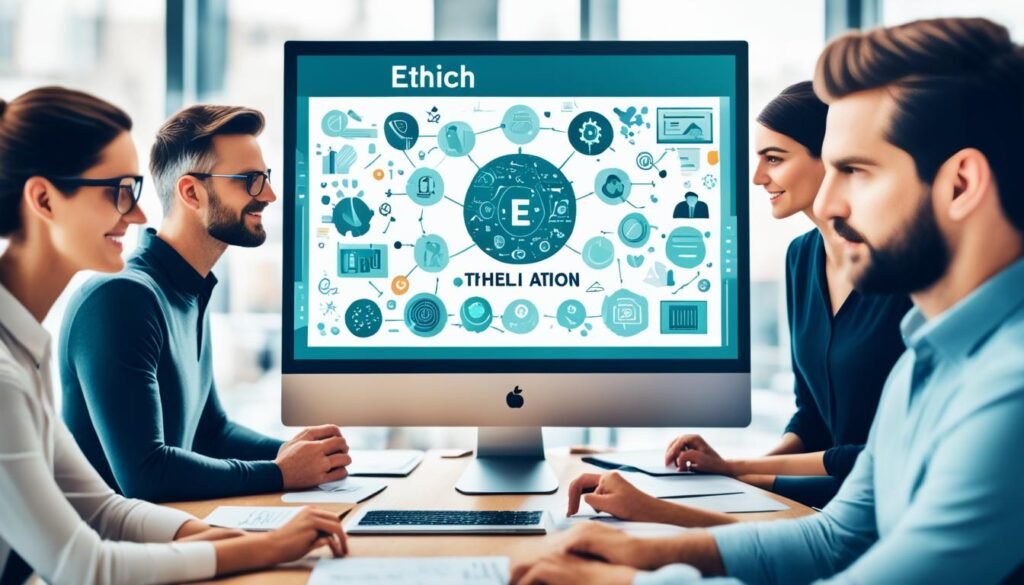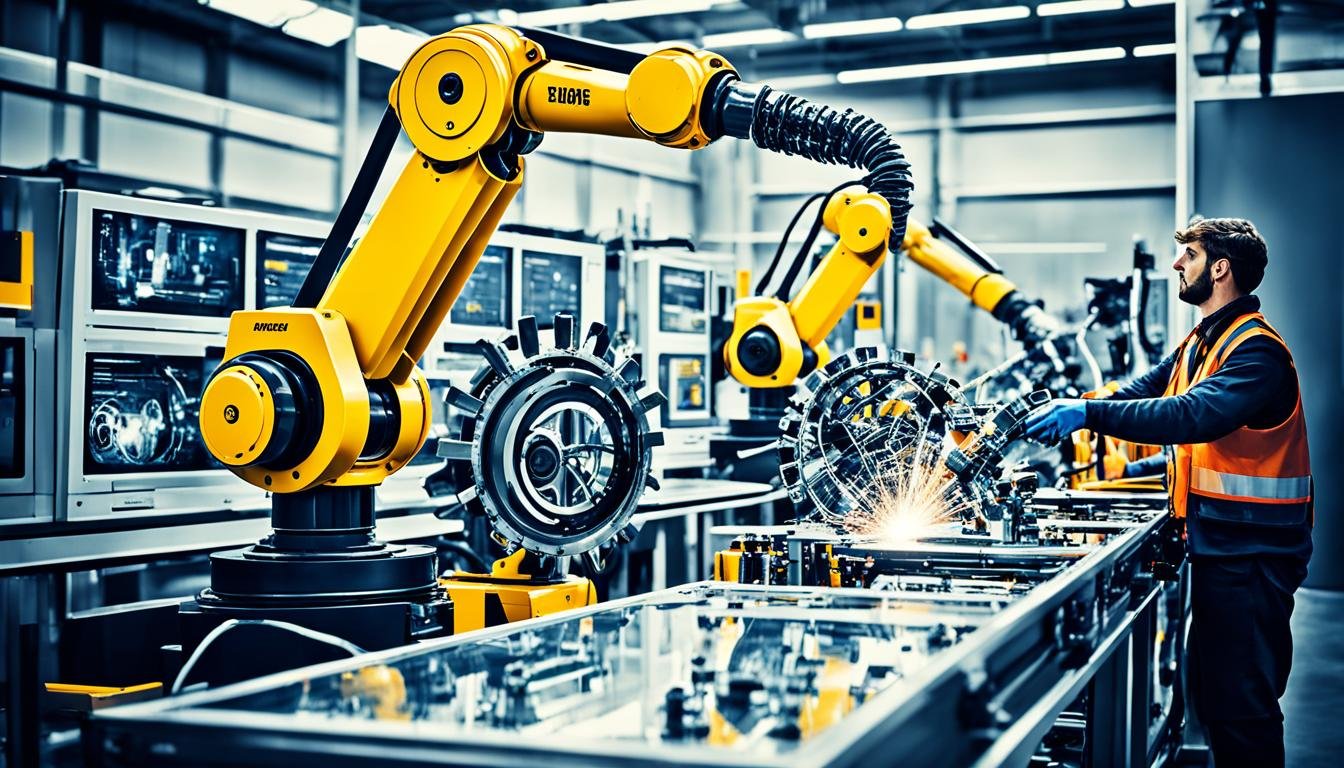Artificial Intelligence (AI) is moving fast, making people worry about losing their jobs. But, the truth is more complex. AI is not a big threat. Instead, it’s a tool that can make our work better by adding to our skills and making tasks more efficient and creative.
AI can take over simple, hard tasks in places like manufacturing. This lets people work on harder tasks that need thinking and problem-solving. As AI gets better, new jobs are coming up in AI research, development, and analyzing data.
Key Takeaways
- AI is reshaping the job landscape, but it is not an imminent threat to human workers.
- AI can enhance productivity by handling routine tasks, freeing up humans to focus on more complex, creative work.
- The advancement of AI is creating new job opportunities in fields like AI research, development, and data analysis.
- AI can augment human capabilities, empowering workers to achieve more in less time.
- AI-driven analytics can assist in data-informed decision-making, improving outcomes across various sectors.
AI as a Collaborative Partner, Not a Competitor
As AI becomes more common in the workplace, we need to see it as a partner, not a threat. AI can boost and add to what humans do well.
AI as a Complementary Tool to Enhance Human Skills
AI won’t replace jobs, but it can help improve human skills, creativity, and strength. Studies show that automating work to cut jobs only brings short-term gains. The real wins come when humans and AI work together, using their strengths to innovate and work more efficiently.
Automation of Repetitive and Mundane Tasks
AI can team up with humans by taking over repetitive and data-heavy tasks. Companies do best when humans and AI work together, not when one replaces the other. This lets workers focus on strategy, problem-solving, and creativity, making their jobs more fulfilling.
AI helps with organizing data, chatting with people, and making basic documents, freeing workers from dull tasks. This partnership lets companies be more productive and innovative.
| AI’s Role as a Collaborative Partner | Potential Benefits |
|---|---|
| Enhancing human cognitive skills and creativity | Increased innovation and problem-solving |
| Automating repetitive and mundane tasks | Freeing up human workers to focus on higher-value activities |
| Providing data-driven insights and recommendations | Improved decision-making and operational efficiency |
For AI to work best, companies need to be open to change and learning. They should give their workers the training and tools to work well with AI.
“Companies are advised to reimagine their business processes, utilizing AI to achieve operational flexibility or speed, greater scale, better decision making, or increased personalization of products and services.”
By focusing on people in AI integration, businesses can make the most of this new technology. This approach empowers their workers and supports long-term growth.
New Job Opportunities in the AI Era
The AI revolution is changing how we work, creating new jobs in artificial intelligence. More people are needed in AI fields, especially in healthcare. This shift is making the job market exciting and diverse.
Rising Demand for AI Specialists and Related Professions
AI technology is moving fast, making certain skills more valuable than ever. Jobs like data scientists, machine learning engineers, and AI ethicists are sought after. These roles help companies use AI to innovate and improve.
- Data scientists work with complex data to find insights that help AI make better decisions.
- Machine learning engineers create AI algorithms that learn from data on their own.
- AI ethicists make sure AI is used responsibly, thinking about privacy, fairness, and transparency.
AI-Driven Job Creation in Healthcare
Healthcare is a big winner in the AI job market. AI is changing how we look at medical images, diagnose diseases, and find new medicines. This means more jobs for experts in AI healthcare.
| AI-Powered Healthcare Roles | Description |
|---|---|
| AI-Powered Medical Imaging Specialist | Works on AI to make medical images better and faster, helping catch diseases early. |
| AI-Powered Diagnostics Engineer | Creates AI tools to quickly and accurately check patient data, helping doctors make good choices. |
| AI-Powered Drug Discovery Scientist | Uses AI to find new medicines faster, making the process more efficient. |
As AI grows, so do the job options, especially in healthcare. AI is changing medical care for the better, offering new paths for professionals.

AI Augmentation of Human Capabilities
AI technology is getting better and is now used to make human work easier and better. Instead of seeing AI as a rival, smart companies see it as a partner. This partnership makes work more productive and effective.
In healthcare, AI helps doctors look at medical images fast and accurately. This means doctors can make quicker, better diagnoses, which helps patients. In law, AI looks through lots of legal documents to find what’s important. This lets lawyers focus on what they’re best at: understanding complex legal matters.
AI also helps in customer service. Chatbots handle simple questions, so people can talk to customers about harder topics. This makes customers happier and helps workers do more.
Using AI at work shows how it can make people work better and faster. It takes over simple tasks, so people can do more important work. This change is a big step towards working better together with machines.
| Industry | AI-Driven Productivity Gains |
|---|---|
| Healthcare | Faster and more accurate medical image analysis |
| Legal | Streamlined legal research and document review |
| Customer Service | Efficient handling of routine inquiries by AI chatbots |
As AI becomes more common in work, it’s clear it can really help people do more. By working together, companies can help their workers do amazing things. This gets everyone ready for the future of work with AI.
Enhancing Decision-Making with AI
In today’s world, artificial intelligence (AI) is changing how companies make decisions. It helps businesses use big data to make smarter choices. This leads to better decisions and strategies.
AI-driven Analytics for Data-Informed Decisions
Since 2019, more than half of companies have started using AI. These tools quickly go through lots of data to find patterns and trends. This gives companies a big advantage, making more money and running better.
AI Assistance in Diagnosis and Treatment Recommendations
AI is also changing healthcare. It helps doctors make better diagnoses and treatment plans. By looking at lots of medical data, AI gives doctors new insights. This teamwork between AI and doctors leads to better patient care.
| Key AI Adoption Statistics | 2019 | 2022 |
|---|---|---|
| Companies utilizing AI | 20% | 50% |
| Average AI capabilities per organization | 1.9 | 3.8 |
| Companies allocating over 5% of digital budgets to AI | N/A | 50% |
| Anticipated increase in AI investment over next 3 years | N/A | 63% |
These numbers show how fast and wide AI is spreading in different fields. It’s changing how decisions are made. With AI, companies can make smarter choices, leading to more innovation and success.
“AI is not about replacing humans, but about empowering them to make better decisions. The synergy between human expertise and AI-powered analytics is the key to unlocking unprecedented levels of business success.”
how ai replace human jobs
Artificial intelligence (AI) is changing the job market fast, making people worry about losing jobs. Experts think AI might replace about 800 million jobs by 2030. Right now, 14% of workers are losing their jobs because of AI.
AI is getting better and doesn’t need humans as much, which could lead to more job losses. Big companies are using AI more than small ones, making a big gap in using new tech. Jobs that need programming and analysis are at risk, especially for those making $80,000 a year.
AI is changing the job world, with IT pros leading the way in using AI at work. It can automate boring tasks, letting workers do more interesting work. But, AI could also lead to job losses in fields like customer service, accounting, research, and retail.
| AI Replacement of Human Jobs | Impact |
|---|---|
| Manufacturing jobs lost since 2000 | 1.7 million |
| Jobs predicted to be replaced by AI by 2025 | 85 million |
| New jobs predicted to be created by AI by 2025 | 97 million |
| Jobs predicted to be automated by 2030 | 300 million full-time |
| Percentage of US and European jobs that may be automated | 25% |
| Manufacturing jobs that could be replaced by AI by 2025 | 2 million |
| Percentage of employees globally that might need to change careers by 2030 | 14% |
AI could take many jobs, but it also brings new chances for jobs and makes work more efficient. As we move forward, we need to use AI wisely and think about its effects on jobs.
Historical Perspective on Job Evolution
Throughout history, new technologies have changed jobs more than they’ve ended them. Automation has been around for centuries, making some jobs obsolete but creating new ones. Now, with artificial intelligence (AI), workers are moving into roles that need empathy, creativity, and critical thinking.
The growth of online shopping didn’t kill jobs; it brought new ones like digital marketing and customer service. The AI era will likely do the same, changing jobs but not eliminating them.
Job Adaptation in Response to Technological Advancements
When new technologies came along, they changed old jobs but also created new ones. In the 16th century, William Lee made a machine to make stockings, changing manual work. The Industrial Revolution in the 19th century brought big changes for English textile workers with steam machines.
In the 20th century, robots started helping in car factories with tasks like welding and moving parts. The COVID-19 crisis sped up the move to the Fourth Industrial Revolution, focusing on keeping technology human-friendly. Now, as AI takes over simple tasks, workers need to learn new skills to keep up.
Emergence of New Roles and Industries
New technologies have always led to new jobs and industries. E-commerce, for example, didn’t cut jobs; it created new ones in digital marketing and customer service. The AI era will likely bring new roles that use human skills like empathy and creativity.
As AI gets smarter, with AGI and ASI, the job market will keep changing. It’s important to balance using smart automation with keeping jobs that need human touch. This way, technology will improve our lives without taking away our jobs.

“Historically, technological advancements have led to job evolution rather than job extinction.”
The Shift Towards White-Collar Job Disruption
Artificial intelligence (AI) is changing the job market fast, moving from blue-collar to white-collar jobs. It’s now targeting jobs that pay up to $80,000 a year. This change is different from before, when automation mainly hit manual jobs.
AI’s Impact on Educated, White-Collar Professionals
A Pew study says 19% of U.S. workers face a lot of AI at work. These jobs often go to women, white or Asian people, and those making more money. They also need a college degree.
On the other hand, 23% of workers don’t face much AI. The study used data from the U.S. Department of Labor. It found that in 2022, workers in jobs most affected by AI made about $33 an hour. Those in jobs less affected made around $20 an hour.
Automation of Programming and Analytical Roles
AI tools like ChatGPT and Google’s Bard are making many white-collar tasks easier. They help with programming, data analysis, and even creative work. This means AI could take over a big part of what college-educated workers do, leading to job losses and skills mismatches.
A study by OpenAI showed that AI could help with 10% to 70% of tasks. Jobs needing a college degree or more could see 64% of tasks automated. This big change in the job world is a big worry that needs careful planning.
Adding AI to the workplace brings challenges. With more AI jobs appearing, companies need to train workers. This change needs everyone – workers, employers, and lawmakers – to work together. They must make sure the workforce is ready for the future.
Ethical Considerations and Frameworks
AI tools are changing many industries but bring up ethical and legal issues. For instance, if AI makes content that breaks copyright laws, who is to blame? Is it the user, the AI, or the data it was trained on? Also, if AI makes biased or harmful content, who should face the fallout?
To tackle these problems, we need ethical and legal rules for AI tools. These rules should cover how AI is made, used, and deployed.
Transparency, Accountability, and Fairness in AI Design
These rules must make sure AI is transparent, accountable, and fair. Clear AI systems let people check if the models are fair, accurate, and reliable. This builds trust and makes sure someone is accountable.
Explainable AI helps us see how the AI works, what data it uses, and why it makes certain decisions. This makes AI more understandable and trustworthy.
Promoting Human Values in AI Systems
These frameworks should also promote human values like privacy, dignity, and freedom. As AI becomes a bigger part of our lives, it’s key that it respects our basic rights. There are worries about AI surveillance and the misuse of our data, showing we need strong privacy laws.
The White House has given $140 million to AI research, and U.S. agencies are fighting bias in AI. Researchers are creating explainable AI to tackle the “black box” problem. As AI use grows, focusing on ethical AI, transparency, and human values in AI systems is crucial.

“Transparency and accountability are crucial in understanding and addressing potential biases in AI models.”
Conclusion
Artificial Intelligence is not a threat to jobs as many think. It’s a tool that can make our work better, more creative, and meaningful. AI can be a great partner in our work, letting us focus on what we love while it takes care of the rest. As technology keeps getting better, it’s key for us to learn and grow with AI, not fear it.
By embracing AI, we can make our work lives better and help create a future where humans and machines work together for good. It’s important to have rules and laws for AI to make sure it’s used right. This way, AI can be a positive force that helps us solve big problems.
The AI era is changing the job world, and we must get ready for it. By learning new skills, adjusting, and promoting ethical AI development, we can make sure technology boosts our abilities, not replaces them.
FAQ
How is AI reshaping the job landscape?
AI is changing the job world, but it’s not a threat. It’s a tool that can make our work better. It helps us by adding to our skills, making tasks more efficient, and boosting creativity.
Can AI replace human jobs?
AI isn’t a threat to jobs like many think. Instead, it’s a partner that helps us work better. It opens new jobs in AI research, development, and data analysis.
How can AI complement human skills?
AI takes over the boring, repetitive tasks. This lets humans focus on creative and complex work. This teamwork makes us more efficient and cuts down on boring work.
What new job opportunities are created by AI?
AI brings new jobs in AI research, development, and data analysis. It also opens doors in healthcare and finance. These jobs need skills in machine learning engineering and AI ethics.
How can AI augment human abilities?
AI makes us more productive. Doctors can quickly and accurately analyze medical images with AI. Customer service agents give fast answers with chatbots.
How can AI assist in decision-making?
AI gives us insights from lots of data. In business, it helps make smart decisions. In healthcare, it helps diagnose and suggest treatments.
What are the ethical considerations for AI?
Using AI raises big questions about rights, privacy, and who’s to blame. We need rules that make sure AI is used right. These rules should protect our values and keep things transparent.
